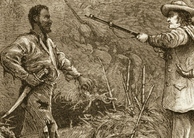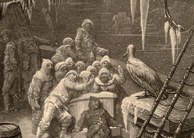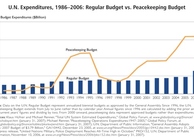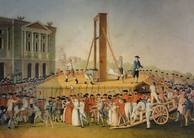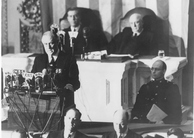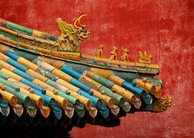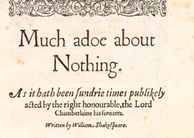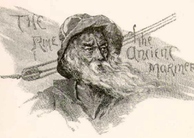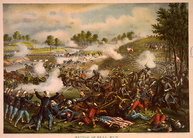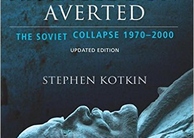|
2010 Volume 2 Issue 1
2010, Vol. 2 No. 01
The same, it seems, is true of royalty, except that it is not only the family name on the line, but that of the entire country. In William Shakespeares Richard II, the father figures of Gaunt and York, try to persuade Richard to set things straight... Read Article »
2010, Vol. 2 No. 01
Frederick Douglass’ statement about slavery concisely defines the effect that such an institution had on the entire shape of a nation: Without slavery, how does one understand freedom? For hundreds of years, the United States thrived economically... Read Article »
2010, Vol. 2 No. 01
Jean-Paul Marat, notorious for his inspiring yet aggressive publications during the French Revolution, was one of the most influential characters of the late 18th century. Indeed, his radical publications helped induce the violent manner of the... Read Article »
2010, Vol. 2 No. 01
Omer Bartov’s essay from Intellectuals on Auschwitz expresses the author’s dismay with the postwar and postmodern representations of, and discourses on, the Holocaust. He breaks down larger concepts on memory and history into five segments... Read Article »
2010, Vol. 2 No. 01
Samuel Taylor Coleridge’s “The Rime of the Ancient Mariner” is about a man on a voyage by ship, who in one impulsive and heinous act, changes the course of his life – and death. The Mariner faces an inner struggle over... Read Article »
2010, Vol. 2 No. 01
It has become undeniable that illicit weaponry, specifically small arms and light weapons pose an unprecedented global security threat. In fact it may almost be acceptable to say that with the turn of the 21st century, we witness a world which is... Read Article »
2010, Vol. 2 No. 01
The French Revolution marks a stain in history, notorious for one of the bloodiest periods in modern civilization. Whether this infamous violence existed at the birth of the Revolution or only during the Terror has been the topic of debate between... Read Article »
2010, Vol. 2 No. 01
In 1961, nearly a decade after the “Golden Age” of television had passed, commercial television was still changing the American lifestyle, from living rooms to bars. It was then that Federal Communications Commission (FCC) chair Newton... Read Article »
2010, Vol. 2 No. 01
Throughout the twentieth-century, nuclear weapons got deadlier; their range and power have both increased, bringing the potential for greater devastation to the globe. To limit the spread of nuclear weapons, the international community adopted the... Read Article »
2010, Vol. 2 No. 01
In Mary Shelley’s Frankenstein, the author characterizes each woman as passive, disposable and serving a utilitarian function. Female characters like Safie, Elizabeth, Justine, Margaret and Agatha provide nothing more but a channel of action... Read Article »
2010, Vol. 2 No. 01
Shakespeare was a man surrounded by controversy. He, himself, has a biography filled with holes and question marks. Some have even held that the great English Bard could not have been one man. Although the idea that Shakespeare was... Read Article »
2010, Vol. 2 No. 01
“Yesterday, December 7th, 1941 -- a date which will live in infamy…” is one of the most recognized speeches in United States history.[1] Franklin Delano Roosevelt spoke firmly and directly on December 8, 1941 of a Japanese &ldquo... Read Article »
2010, Vol. 2 No. 01
Transgender children are some of the most vulnerable students in America’s schools. Nobody knows how many there are, and very few educators know what to do with them. Despite extensive advocacy efforts, trans youth are subjected to bullying... Read Article »
2010, Vol. 2 No. 01
Since 1989, when economist John Williamson first conceived of the economic and policy recommendations known as the Washington Consensus (Williamson, 1989), this Consensus became generally accepted as the most effective model by which developing... Read Article »
2010, Vol. 2 No. 01
In William Shakespeare’s Much Ado About Nothing, all of the main characters experience and participate in some form of deceit designed to dupe another character. However, among the societal members of Messina, Don John particularly stands... Read Article »
2010, Vol. 2 No. 01
As medical and biological technology has progressed in recent years, concerns have been raised about the privacy implications of genetic records that can identify individuals and predict future conditions to which they are predisposed. According... Read Article »
2010, Vol. 2 No. 01
The poems which Sylvia Plath composed in the weeks and days immediately preceding her death contain some of the most disturbing themes present in Modernist poetry. In Ariel, an anthology containing her most fervent, emotional, and troubling poetry... Read Article »
2010, Vol. 2 No. 01
In A Midsummer Night’s Dream, Shakespeare plays with the themes of love, art, imagination, and dreaming to forge an overall meaning for his work. His play within a play, found in Act V, expands on his themes and portrays the relationship... Read Article »
2010, Vol. 2 No. 01
Mass media is perhaps the most powerful tool in the world for creating, changing or perpetuating society’s ideas about an issue or group of people. It works both overtly and subconsciously: deciding which issues are important, how to frame... Read Article »
2010, Vol. 2 No. 01
After the wave of liberalization of many African states in the late twentieth-century, the world has seen a rise in the amount of international and internal conflicts that have taken thousands of human lives. Ethnic tensions and economic hardships... Read Article »
2010, Vol. 2 No. 01
Party identification among individuals is determined by multiple factors including current marital status and other variables such as income and education level. The rate of marriage for people over the age of 18 in the United States has decreased... Read Article »
2010, Vol. 2 No. 01
In the world of the American slave, violence and control were intimately connected. As Frederick Douglass notes, “Men are whipped oftenest who are whipped easiest,” a sentiment that points to the cyclical nature of violence against the... Read Article »
2010, Vol. 2 No. 01
Elizabeth Bishop, known for her reticent poetic style, reveals the secrets of her personal life through carefully wrought metaphors. In her villanelle, “One Art,” Bishop reveals the purpose of art and the significance of poetic... Read Article »
2010, Vol. 2 No. 01
If you happen to check in to the Grand Hyatt San Francisco on a windy day, you’ll receive a friendly note at the front desk advising you that the 35-story skyscraper may creak a bit as it moves gently back and forth in the wind. Though the... Read Article »
2010, Vol. 2 No. 01
Jean-Baptiste Clamence in Albert Camus's The Fall and the mysterious Ancient Mariner in Samuel Taylor Coleridge’s Rime of the Ancient Mariner each experience something that radically shifts his worldview and his view of himself. Arrogant and... Read Article »
2010, Vol. 2 No. 01
From 1954 to 1989, Paraguay was subject to the authoritarian regime of Alfredo Stroessner and the Colorado Party. While Stroessner came to power at a time of great economic strife, it was the most prosperous time of his regime that led to his downfall... Read Article »
2010, Vol. 2 No. 01
The legacy of the American Civil War with which we are left is one that emphasizes a participatory American populace, overwhelmingly enthused over and invested in the conflict. Particularly in the North, we are likely to think of a cooperative culture... Read Article »
2010, Vol. 2 No. 01
When the United States purchased Alaska from the Russian Empire in 1867, it did not simply grow by 663,000 square miles; it also accepted responsibility for the people living within its new borders. But America has not fulfilled its responsibilities... Read Article »
2010, Vol. 2 No. 01
It is tempting to classify literary, cinematic, and historical characters into groups. The trouble, of course, is that such labels can be misleading at best, and severely subjective and variable. When using terms such as hero, villain, anti-hero... Read Article »
2010, Vol. 2 No. 01
William Shakespeare’s Richard III is no doubt a fascinating character and an entertaining villain. It is Shakespeare’s command of the English language, and his keen sense of drama and psychological depth, that make his plays so affecting... Read Article »
2010, Vol. 2 No. 01
‘WHO WERE THOSE PEOPLE?’ historian Howard Zinn asked a member of the Sacco and Vanzetti Commemoration Society in November 2008. Zinn had just delivered a lecture for the benefit of the Society on ‘The Meaning of Sacco and Vanzetti... Read Article »
2010, Vol. 2 No. 01
As the world's first real Marxist experiment, the Soviet Union, by virtue of lasting seventy odd years, proved Western intelligentsia wrong. The latter had long thought it was doomed to fail. When the Berlin Wall fell in 1989 and the Soviet Union... Read Article »
2010, Vol. 2 No. 01
The attacks of September 11th have frequently been characterized as unimaginable, capable of inflicting confusion and emotional trauma beyond the scope of other historical events. On September 12th, 2001, N.R. Kleinfeld of the New York Times asserted... Read Article »
2010, Vol. 2 No. 01
From before its birth to the present, the expansion of US power has been analogous to an ever-expanding hand upon the globe. Despite some of today's historically inaccurate politicians citing a revered past of non-interventionism and isolationism... Read Article »
2010, Vol. 2 No. 01
Oppression tends to exist in compartmentalized, clearly labeled categories of race, social class, gender, or sexual preference. While these rigidly defined categories may have been applied to allow for rational discussion of problems and solutions... Read Article »
2010, Vol. 2 No. 01
In the immediate aftermath of September 11th, the reaction of the French media was one of passionate empathy. The September 12th headline of Le Monde reads simply “Nous sommes tous Américains” (We are all Americans).[1] Yet as... Read Article »
2010, Vol. 2 No. 01
Sylvia Plath‘s The Bell Jar is about a young woman named Esther Greenwood entering college in the early 1950’s, a time before the second wave of the women’s movement had been implemented. Esther has dreams of becoming a famous... Read Article »
2010, Vol. 2 No. 01
One of the more overt dilemmas in the music of Ocean’s Eleven was the necessary need to reflect on the idea of old guard Las Vegas and the obvious modernity of the time in which the movie is set. It epitomizes classic Rat Pack versus online... Read Article »
2010, Vol. 2 No. 01
In 1994 South Africa's regime of apartheid, under which the black majority was suppressed and discriminated against by the white minority, came to an end.1The African National Congress (ANC) won the first free elections in the same year, and the... Read Article »
2010, Vol. 2 No. 01
Or, they can contact Weather Modification Incorporated in Fargo, North Dakota and order some “enhanced precipitation” or “hail damage mitigation.” It sounds like science fiction, but in many places around the world, scientists... Read Article »
2010, Vol. 2 No. 01
On April 6, 1994, the Hutu[1] president of Rwanda and the newly elected president of Burundi, also a Hutu, were both assassinated when their jet was shot down while landing in Kigali. In response to the April killing of the two state presidents,... Read Article »
Issue Archives
2025 - Volume 17
2024 - Volume 16
2023 - Volume 15
2022 - Volume 14
2021 - Volume 13
2020 - Volume 12
2019 - Volume 11
2018 - Volume 10
2017 - Volume 9
2016 - Volume 8
2015 - Volume 7
2014 - Volume 6
2013 - Volume 5
2012 - Volume 4
2011 - Volume 3
2010 - Volume 2
2009 - Volume 1
|

